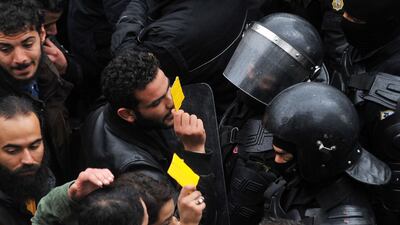In a gloomy dusk even the desire to cross Avenue Bourguiba in Tunis on the day after the Ben Ali regime fell was something of an act of faith.
A caretaker administration was gingerly attempting to oversee the transfer of power. There was an evening curfew and it was holding with few challenges.
Soldiers on the main tree-lined road were relaxed enough to allow a hardy few, our hands held high, to walk slowly over the central reservation for a pre-arranged dinner.
Everyone knew what was at stake for Tunisia when the country turfed out the man who had held power for two-and-a-half decades.
Less clear was what the country could gain from risking all for a new of type of politics.
Seven years on, there are new street protests rocking the nation. It is increasingly clear just how much the odds are stacked against Tunisia making a success of its democracy.
Far from capitalising on freedom, Tunisia is a beleaguered mid-income nation struggling to hold its few selling points.
With negligible international backing, the youthful population has never had the benefits of large-scale investments that would transform the economy.
Advantages since the 2011 Jasmine revolution should have set Tunisia apart from other Arab states that faced the same challenges.
A quirk of the proportional representation system denied the Muslim Brotherhood an opening to form a majority government. The MB-backed Al Nadha party and its leader Rachid Ghannouchi chose to set aside its religious agenda to prioritise civilian political ambitions.
Mr Ghannouchi has sought to make his political position into an international model. With the help of international image consultants, his party has wooed opinion-makers to promote its approach.
Within Tunisia, frequent changes in the composition of governments has thwarted a schism with the military.
Other elements of normality have also been maintained. Despite ISIL-inspired attacks, tourism has continued, albeit at a much lower level than before. Agriculture remains the rural bedrock and the Mediterranean economy still absorbs some exports.
Tunisians need only look across the border to Libya to see the consequences of a power vacuum. Or they can peer into Algeria to see the claustrophobic effect of too much control.
Internal politics are, however, bleak.
How to resolve the issues that have forced its citizens back to the streets?
Tunisia benefited from the modernist agenda of Habib Bourguiba in the years that followed independence.
While authoritarian, he prioritised education and was masterful enough to secure tolerance for his reforms within an Islamic context.
But there is a saying that a little bit of education is a dangerous thing.
_______________________
Read more from Opinion
ADNAN AMIN The falling cost of renewables brings new economic opportunity to the Gulf
HUSSEIN IBISH Trump won't advance a coherent foreign policy through disruption and volatility
SHELINA JANMOHAMED Celebrities should take a stand and we should push them to do so
_______________________
Under Ben Ali there were plenty of institutes that responded to population growth by churning out more graduates. That set the seeds for Ben Ali’s downfall.
The self-immolation of Mohamed Bouazizi, a street vendor in the central town of Sidi Bouzid, on December 17, 2010 sparked the protests that saw the president flee seven years ago today. Bouazizi held a diploma from a technical college. It was worthless in the job market but created a debt trap that held back his family.
The slight that cost his livelihood triggered a violent personal reaction that reverberated far wider than he could have known.
This newspaper reported last month that there was a self-immolation every three days in Tunisia. Despair continues to contribute to a clear trend.
Any form of politics that provided livelihood improvements to address this problem would be transformational. Tunisia’s fix is austerity, which cannot realistically create significant economic gains while internal resources are so stretched and the state cannot spend its way to prosperity.
The situation amounts to an indictment of the international economic framework. It purports to provide a virtuous circle of growth and cross-border solidarity yet neglects a tranche of strategic nations.
Rules that govern foreign aid are prejudiced against large-scale spending in countries that are not desperately poor. These are just the places that could most benefit from market-focused international coordination.
Helping countries like Tunisia has an outsized strategic effect. It is demonstrably important that European states are able to bolster incomes on the southern shores of the Mediterranean. This is not just for security reasons. The migration pressures emanating from Africa are a vast challenge.
The OECD rules on development aid are heavily skewed against interventions in countries that fit Tunisia’s profile. This has consequences for how developed nations have engaged in its crisis.
It also has ramifications for international lenders and other multilateral bodies.
The result is that the impact of foreign actors can only be muted. Historical trends bear down on the struggling politicians. The country cannot fall back on moderating influences.
Tunisia has had a remarkable political transformation. It sets a dangerous example that it cannot deliver any of the benefits to its population.

